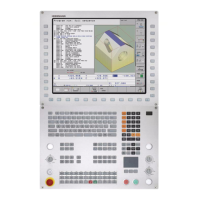6 – 60 HEIDENHAIN Service Manual iTNC 530 HSCI
Possible effects
of contaminated,
loose, defective
encoders
The mentioned error messages and errors in the control loop can also be caused by contaminated or
defective encoders!
For example, a contaminated field of a scanning head with 4-field scanning can degrade the on-to-off
ratio which has a negative effect on the feedback control of the machine axis. As long as the on-to-off-
ratio is not outside the tolerance, no encoder error message is generated.
If a scanning head or a motor encoder has become loose, the encoder signals may still be sufficiently
evaluated. This means that no encoder error message is generated. During traverse, and in particular
when the direction is changed and if the machine axes vibrate, the above error messages may be
generated, as the machine and the encoder are no longer connected firmly.
In exceptional cases, due to defective electronics or a damaged cable, constant voltages may be
supplied to the control that are within the tolerance range of the encoder specifications. This means
no encoder error message is generated.
For an analysis you can proceed as follows:
8 Increase the monitoring limits (e.g. for the servo lag). -- > A longer distance can be traversed before
an error is generated.
8 Now inspect the encoder signals with an appropriate measuring device (e.g. PWM 9, See ”PWM 9
encoder diagnostic kit” on page 30 – 564).
--> When the axis is moved, the signal must change (sine, cosine)!
8 Observe the on-to-off ratio, the amplitude height, etc.
8 Finally, restore the original monitoring tolerances!
8 If necessary, clean or replace the encoder. The mechanics may also require reconditioning.
Before starting any extensive inspections of the mechanics, the "electrician" can also check
the components in the electrical cabinet (power modules, etc.) first.
For detailed descriptions of how to examine HEIDENHAIN drives, refer to the Service Manual
”Inverter Systems and Motors”.
Increasing the monitoring limits reduces the safety of the machine!

